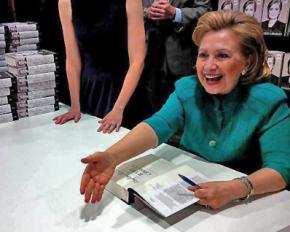Hard times for the Clintons?
does the math on Hillary Rodham Clinton's claim that she was broke.
LAST WEEK, Hillary Rodham Clinton sat down for an interview with ABC News' Diane Sawyer, who asked about Clinton's wealth and income. Her response is a good indicator of just how detached the Clintons are from the experiences of the overwhelming majority of humanity.
The former Secretary of State and U.S. Senator--who's flogging her new book Hard Choices in what is widely seen as a first campaign tour for another run at the White House in 2016--said that while it's true her family is well off now, when she and former president Bill Clinton left the White House in 2001, they were--get this--"dead broke."
That's right, they had "no money," Clinton claimed, and had to "struggle" to "piece together the resources for mortgages and houses," and for their daughter's education. It was "not easy," she said--and was only overcome through their "hard work."
Were the Clintons "dead broke"? Hardly.
Bill Clinton's presidential pension alone--which former presidents receive annually for life--was nearly $200,000. That's 13 times more than what a minimum-wage worker earns per year.

And note what Clinton claims they were "struggling" to afford: houses. As in more than one of them.
These weren't fixer-uppers either. One of the mortgages was for a gated house in the wealthy suburb of Chappaqua, N.Y., purchased in 1999 for $1.7 million. And why did the Clintons buy this place when they had a perfectly decent place to live in another gated residence in Washington, D.C.? Primarily to position the former first lady for an easy run for the U.S. Senate in a Democratic Party stronghold.
While the Clinton family "struggled" to pay mortgages on real estate worth millions of dollars, millions of people were struggling month-to-month to make payments on subprime loans that, unbeknownst to them, would soon blow up in their faces. The government and banking policies that both Clintons supported as powerful government officials would eventually lead to over 10 million people being booted from their homes as the housing crisis was a catalyst for the worse crisis of the capitalist system since the Great Depression of the 1930s.
THE GUTTING of welfare programs that President Clinton signed into law in 1996 didn't help either, causing hundreds of thousands of people to slip into extreme poverty.
Then there's the second expense that Clinton said was hard to afford--their daughter's education at Stanford, Oxford, Columbia and New York Universities.
The Clintons' "hard work" ended up being a good investment here, too. Like any parent who tries to help their children have a better life than they did, they were overjoyed when daughter Chelsea found true love and scraped together $3 million for her 2010 wedding to investment banker Marc Mezvinsky--a pauper's wedding if there ever was one.
And by the way, how much grueling "work hard" and "struggle" did it take for the Clintons to dig themselves out of "poverty"? Less than a year. After leaving the White House at the start of 2001, their combined annual income by the end of the year was $15.5 million--more than a thousand times the income of a low-wage worker.
Clinton's response about tough times came after a question from Sawyer about the fact that Bill Clinton has received $100 million as a paid public speaker, and she had gotten $5 million doing the same. That's more money than tens of thousands of workers see in a year.
Dead broke? More like filthy rich.
All of this solicited but lukewarm criticism--and in many cases, matter-of-fact non-criticism--from the mainstream press. Clinton's outrageous comments were mentioned in news coverage of the tour for exactly one news cycle--before appearances by members of Congress and a Supreme Court judge at a Costco book-signing event replaced them as the dominant "newsworthy" element of the tour.
This is but one incident that speaks to the social position of people like Clinton, but one that should inform the decision of people on the left--who oppose the gutting of welfare and the vast gap between rich and poor--about who they support in the 2016 presidential elections.
Instead of backing people who live in a completely different world from the rest of us and who have no idea what the vast majority of us go through on a daily basis, we should build an independent political alternative to fight for policies that benefit the working majority. What the rich and powerful consider to be "hard choices"--how to afford multiple mansions, elite schools and campaigns for the White House--are completely different from the actual difficult decisions that working people have to make every day.


